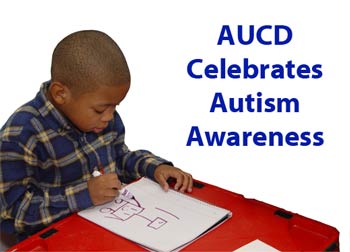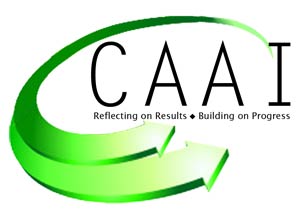AUCD Celebrates April as Autism Awareness Month
April 1, 2012

|
On December 18, 2007, the UN General Assembly designated April 2 as World Autism Awareness Day; it was first observed in 2008. This UN resolution is one of only three official disease-specific United Nations Days that brings world attention to autism, a developmental disorder that new CDC estimates indicate affects 1 in 88 American children. In this spirit, the entire month of April is recognized as National Autism Awareness Month1.
AUCD joins the autism community in celebrating this month focused on raising awareness of the needs of families and individuals affected by autism and the research and training that is underway to address those needs. Although significant progress has been made over the past few years a great deal more needs to be done in developing appropriate services and supports for children, adolescents and adults on the autism spectrum and their families.
AUCD and our national networks are taking action by providing cutting edge information news, events, and resources. AUCD's network of nonprofit university-based interdisciplinary centers which include: 67 UCEDDs; 43 LENDs; and 16 IDDRCs work in every state and territory to advance policy and practice for people living with disabilities and their families. Following are just a few of the highlights of AUCD's current autism related activities in diagnosis, treatment, supports, professional training, research, and education.
 |
AUCD partners with CDC's NCBDDD and HRSA's MCHB on the "Learn the Signs. Act Early." campaign. The campaign aims to educate parents about childhood development, including early warning signs of autism and other developmental disorders, and encourages developmental screening and intervention. "Learn the Signs. Act Early." builds on familiar experiences of parents, such as monitoring their children's physical growth, and expands to social and emotional milestones such as how children speak, learn, act, and play. As part of this initiative, AUCD supports a growing network of Act Early Ambassadors who serve as state liaisons to the Act Early Initiative and act as a community champion or change agent to increase awareness activities and improvement of early identification practices.
 |
AUCD's Interdisciplinary Technical Assistance Center (ITAC)
The purpose of the Interdisciplinary Technical Assistance Center (ITAC) on Autism and Developmental Disabilities at AUCD is to improve the health of infants, children, and adolescents who have, or are at risk for developing, ASDs and other developmental disabilities. ITAC provides technical assistance to LENDs and Developmental-Behavioral Pediatrics (DBP) programs to better train professionals to utilize valid and reliable screening tools to diagnose or rule out and provide evidence-based interventions for children with ASD and other developmental disabilities.
 |
Combating Autism Act Initiative Webinar Series
The CAAI Webinar series, "Research to Practice" will showcase successes of CAAI grantees, connect attendees with other CAAI grantees, and inform each other of activities happening within the initiative. The series will run from April through August 2012.
Upcoming and past webinars on autism spectrum disorders and other topics are housed in the AUCD Webinar Library. All of our archived webinars are free and open to the general public.
Federal Partner Initiatives for Autism Awareness Month
- National Center on Birth Defects and Developmental Disabilities of CDC here.
- Maternal & Child Health Bureau: Find out about HRSA's Autism Awarenss Month activities and get more information about MCHB's other autism related activities here.
- Eunice Kennedy Shriver National Institute of Child Health and Human Development here.
About Autism Spectrum Disorder
Autism is a complex developmental disability that typically appears during the first three years of life and affects a person's ability to communicate and interact with others. Autism is defined by a certain set of behaviors and is a "spectrum disorder" that affects individuals differently and to varying degrees. There is no known single cause for autism, but increased awareness and funding can help families today. For more information about autism and early warning signs, see CDC's Autism Information Center and Learn the Signs Act Early Campaign.







